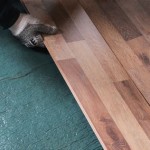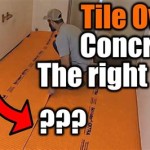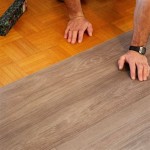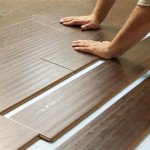Choosing the Ideal Underlayment for Your Basement Vinyl Plank Flooring
Vinyl plank flooring is a popular choice for basements due to its durability, water resistance, and aesthetic appeal. However, selecting the appropriate underlayment is crucial to ensure a successful installation and optimal flooring performance. Here are the essential factors to consider when choosing what to put under vinyl plank flooring in your basement floor:
1. Moisture Control
Basements are prone to moisture, so moisture control is paramount. Choose an underlayment with a vapor barrier to prevent moisture from seeping through the flooring and causing damage. Look for underlayments labeled "moisture resistant" or "vapor barrier." Consider adding a separate vapor barrier if the underlayment does not have one.
2. Insulation and Comfort
Basements can be cold and drafty. An underlayment with insulation properties can provide additional warmth and comfort underfoot. Cork, foam, and felt underlayments are excellent insulators, offering thermal resistance and reducing noise transmission.
3. Sound Absorption
Vinyl plank flooring can be noisy if it is not installed with proper sound absorption. An underlayment can help dampen noise and create a quieter environment. Choose a thick, dense underlayment made of materials like cork, foam, or rubber to minimize sound transmission.
4. Floor Leveling
Basements often have uneven subfloors. An underlayment can help level the surface and create a smooth base for your vinyl plank flooring. Choose an underlayment with a self-leveling feature or consider using a leveling compound before installing the underlayment.
5. Type of Subfloor
The type of subfloor in your basement will influence the underlayment you need. For concrete subfloors, a moisture barrier is essential. For wooden subfloors, choose an underlayment that provides additional support and prevents squeaks.
Recommended Underlayment Materials
Based on these factors, the following underlayment materials are recommended for vinyl plank flooring in basements:
- Cork: Excellent moisture resistance, insulation, and sound absorption
- Foam: Durable, easy to install, and offers soundproofing
- Felt: Affordable, provides some insulation and moisture protection
Tips for Choosing the Right Underlayment
- Consider the specific needs of your basement, such as moisture levels and insulation requirements.
- Choose an underlayment with a thickness of at least 6mm for optimal performance.
- Read manufacturer's specifications and recommendations to ensure compatibility with your vinyl plank flooring.
Conclusion
Choosing the right underlayment for vinyl plank flooring in your basement floor is crucial for durability, comfort, and overall flooring performance. By considering moisture control, insulation, sound absorption, floor leveling, and the type of subfloor, you can select an underlayment that meets your specific needs and ensures a successful flooring installation.

The Best Flooring Options For Your Basement

Best Flooring For Basement Floor City

Tips For Installing Vinyl Plank Over Concrete Floors Lemon Thistle

Lvp Flooring Installation How To Install Luxury Vinyl Plank In A Basement Diy

How To Prepare A Concrete Floor For Vinyl Flooring Parrys

Choosing Underlayment For Vinyl Plank Flooring Your Ultimate Guide Jona Panel S Inc

Installing Luxury Vinyl Plank Flooring In Our Basement Week 5 Of The One Room Challenge Willow Bloom Home

Vinyl Flooring Around Floor Drain Installation Tips And Tricks 1800remodel

Laminate Flooring On Concrete Basement Floors Expert Installation Guide Csg Renovation

Don T Buy New Flooring Before You Check This Out
See Also







